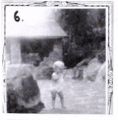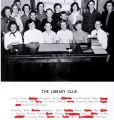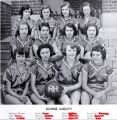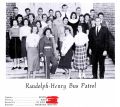Difference between revisions of "User:NightcoreSwift004"
| Line 11: | Line 11: | ||
At the behest of Jean and his father-in-law, Robert worked as a pharmacist for about five years before moving back to Alabama in the early 1930s, settling in {{w|Sylacauga, Alabama|Sylacauga}}. There, he worked for around 20 years as a supplier for {{w|Avondale Mills}}, a textile industry company, excluding a few years of military work during World War II. Receiving $624 a year from Avondale, the family faced financial struggles to the point of moving frequently during the 1940s, as recounted by Bob in a letter detailing their issues with poverty. To supplement the family's income, Jean occasionally worked at Avondale and Robert engaged in the paper business while still working at Avondale. Jean unexpectedly passed away at the young age of 39 in May 1945, shortly before Bob finished high school. Robert Sr. remarried in April 1949 to Dorothy Julia Wolfe, the daughter of a lumber inspector. Dorothy had a daughter from a previous marriage, whom Robert later adopted. | At the behest of Jean and his father-in-law, Robert worked as a pharmacist for about five years before moving back to Alabama in the early 1930s, settling in {{w|Sylacauga, Alabama|Sylacauga}}. There, he worked for around 20 years as a supplier for {{w|Avondale Mills}}, a textile industry company, excluding a few years of military work during World War II. Receiving $624 a year from Avondale, the family faced financial struggles to the point of moving frequently during the 1940s, as recounted by Bob in a letter detailing their issues with poverty. To supplement the family's income, Jean occasionally worked at Avondale and Robert engaged in the paper business while still working at Avondale. Jean unexpectedly passed away at the young age of 39 in May 1945, shortly before Bob finished high school. Robert Sr. remarried in April 1949 to Dorothy Julia Wolfe, the daughter of a lumber inspector. Dorothy had a daughter from a previous marriage, whom Robert later adopted. | ||
In 1955, Robert and his family moved to {{w|Winston-Salem, North Carolina}}, settling in a six-room apartment in the Piedmont Park neighborhood, next to {{w|Smith Reynolds Airport}}. They stayed there for the next 13 years. Robert found employment as a | In 1955, Robert and his family moved to {{w|Winston-Salem, North Carolina}}, settling in a six-room apartment in the Piedmont Park neighborhood, next to {{w|Smith Reynolds Airport}}. They stayed there for the next 13 years. Robert found employment as a security guard for Merchant Patrol service, providing security for retail stores and businesses. He also worked as a security guard, general superintendent and plant manager for a {{w|Western Electric}}'s plant at Chatham Road, the same company where his son Bob worked as an electrical engineer. Despite working two jobs and living in a housing project, his family still faced financial struggles. | ||
In October 1966, Robert received an eviction notice. In February 1967, his landlord informed him that he had been evicted from his Piedmont Park apartment with no reason given. Robert took legal action against the Winston-Salem Housing Authority in Forsyth Superior Court to keep his home. The housing authority claimed he hadn't paid back rent, while Robert insisted he had always paid his rent, despite financial struggles. The Chandlers were allowed to remain in their apartment while the case was on appeal, but they lost the case in January 1968. A judge ordered Robert to pay $345 in back rent immediately, $450 in $10 weekly installments, and to move out by April 1968. After the ruling, Robert stated to a reporter that he wouldn't pay "a penny one" of the back rent, stressing that he had "no property, no money in the bank," and that they could collect nothing from him but a "judgement." | In October 1966, Robert received an eviction notice. In February 1967, his landlord informed him that he had been evicted from his Piedmont Park apartment with no reason given. Robert took legal action against the Winston-Salem Housing Authority in Forsyth Superior Court to keep his home. The housing authority claimed he hadn't paid back rent, while Robert insisted he had always paid his rent, despite financial struggles. The Chandlers were allowed to remain in their apartment while the case was on appeal, but they lost the case in January 1968. A judge ordered Robert to pay $345 in back rent immediately, $450 in $10 weekly installments, and to move out by April 1968. After the ruling, Robert stated to a reporter that he wouldn't pay "a penny one" of the back rent, stressing that he had "no property, no money in the bank," and that they could collect nothing from him but a "judgement." | ||
In April 1968, the Chandlers moved to a six-room house in the Forest Park neighborhood, near {{w|Bowman Gray Stadium}} and {{w|Winston-Salem State University}}. Robert retired in 1970 at age 64, after 15 years | In April 1968, the Chandlers moved to a six-room house in the Forest Park neighborhood, near {{w|Bowman Gray Stadium}} and {{w|Winston-Salem State University}}. Robert retired in 1970 at age 64, after 15 years of service for Merchant Patrol & Western Electric. He passed away in December 1977 at age 71 after three months of metastatic pancreatic cancer. He was Chris's last grandparent to die. | ||
From 1950 to 1962, Robert and Dorothy had seven children, including Wayne Chandler in January 1955 and twin daughters Betty and Joan Chandler in April 1962. Various newspapers regarded Robert as a loving husband and father who fought hard for his family's survival. In 1966, believing his 16-year-old son Ray might have been electrocuted at work, Robert rushed to the workplace to save him and afterward called the fire department and rescue team for help; the boy was not hurt. Robert became an enthusiastic angler after moving to Winston-Salem, frequently visiting the {{w|Outer Banks}} to fish with his family. Locals remembered him as a friendly person who loved telling stories about his youth and once said that [[women's rights|women should never be forced to conform to societal norms imposed upon them]]. | From 1950 to 1962, Robert and Dorothy had seven children, including Wayne Chandler in January 1955 and twin daughters Betty and Joan Chandler in April 1962. Various newspapers regarded Robert as a loving husband and father who fought hard for his family's survival. In 1966, believing his 16-year-old son Ray might have been electrocuted at work, Robert rushed to the workplace to save him and afterward called the fire department and rescue team for help; the boy was not hurt. Robert became an enthusiastic angler after moving to Winston-Salem, frequently visiting the {{w|Outer Banks}} to fish with his family. Locals remembered him as a friendly person who loved telling stories about his youth and once said that [[women's rights|women should never be forced to conform to societal norms imposed upon them]]. | ||
Revision as of 14:14, 9 July 2024
Chris' ancestors sandbox test for a page
Robert Franklin Chandler Sr
Robert Franklin Chandler Sr. (8 February, 1906 - 27 December, 1977) was a textile mill worker and a security guard who was Bob's father and Chris's paternal grandfather.
Born and raised in rural Chilton County, Alabama, Robert was the son of Joseph Jessie Chandler, a farmer and day laborer, and Martha Frances Headley. He was one of the youngest of 14 children in a Baptist family, with five of his siblings dying in infancy. His father was an avid hunter, capable of hunting seven pigs in one day, a hobby many of Robert's brothers took up, though it is unclear if Robert followed suit. Growing up, Robert and his siblings often lived with relatives instead of their parents; Robert lived with his aunt and uncle, Sadie and James Littleton.
After dropping out of high school in his freshman year, Robert worked at a steel mill. At age 18, he moved to the Dallas-Fort Worth area, where he found work as an insurance agent. In June 1926, Robert, a Baptist, married Jean Hollomon, a Methodist and the daughter of a pharmacist, at the Methodist church in Dallas. They were both 20 years old at the time. They had their only child, Bob, in September 1927. Shortly after Bob was born, they moved from Fort Worth to Garland, near Jean's hometown of Wylie.
At the behest of Jean and his father-in-law, Robert worked as a pharmacist for about five years before moving back to Alabama in the early 1930s, settling in Sylacauga. There, he worked for around 20 years as a supplier for Avondale Mills, a textile industry company, excluding a few years of military work during World War II. Receiving $624 a year from Avondale, the family faced financial struggles to the point of moving frequently during the 1940s, as recounted by Bob in a letter detailing their issues with poverty. To supplement the family's income, Jean occasionally worked at Avondale and Robert engaged in the paper business while still working at Avondale. Jean unexpectedly passed away at the young age of 39 in May 1945, shortly before Bob finished high school. Robert Sr. remarried in April 1949 to Dorothy Julia Wolfe, the daughter of a lumber inspector. Dorothy had a daughter from a previous marriage, whom Robert later adopted.
In 1955, Robert and his family moved to Winston-Salem, North Carolina, settling in a six-room apartment in the Piedmont Park neighborhood, next to Smith Reynolds Airport. They stayed there for the next 13 years. Robert found employment as a security guard for Merchant Patrol service, providing security for retail stores and businesses. He also worked as a security guard, general superintendent and plant manager for a Western Electric's plant at Chatham Road, the same company where his son Bob worked as an electrical engineer. Despite working two jobs and living in a housing project, his family still faced financial struggles.
In October 1966, Robert received an eviction notice. In February 1967, his landlord informed him that he had been evicted from his Piedmont Park apartment with no reason given. Robert took legal action against the Winston-Salem Housing Authority in Forsyth Superior Court to keep his home. The housing authority claimed he hadn't paid back rent, while Robert insisted he had always paid his rent, despite financial struggles. The Chandlers were allowed to remain in their apartment while the case was on appeal, but they lost the case in January 1968. A judge ordered Robert to pay $345 in back rent immediately, $450 in $10 weekly installments, and to move out by April 1968. After the ruling, Robert stated to a reporter that he wouldn't pay "a penny one" of the back rent, stressing that he had "no property, no money in the bank," and that they could collect nothing from him but a "judgement."
In April 1968, the Chandlers moved to a six-room house in the Forest Park neighborhood, near Bowman Gray Stadium and Winston-Salem State University. Robert retired in 1970 at age 64, after 15 years of service for Merchant Patrol & Western Electric. He passed away in December 1977 at age 71 after three months of metastatic pancreatic cancer. He was Chris's last grandparent to die.
From 1950 to 1962, Robert and Dorothy had seven children, including Wayne Chandler in January 1955 and twin daughters Betty and Joan Chandler in April 1962. Various newspapers regarded Robert as a loving husband and father who fought hard for his family's survival. In 1966, believing his 16-year-old son Ray might have been electrocuted at work, Robert rushed to the workplace to save him and afterward called the fire department and rescue team for help; the boy was not hurt. Robert became an enthusiastic angler after moving to Winston-Salem, frequently visiting the Outer Banks to fish with his family. Locals remembered him as a friendly person who loved telling stories about his youth and once said that women should never be forced to conform to societal norms imposed upon them.
Joseph Otto Weston
Joseph Otto "Joe" Weston (3 October, 1896 - 8 April, 1955) was a lifelong tobacco farmer who was Barb's father and Chris's maternal grandfather.
Born and raised in rural area of Red Oak, Virginia, he was the 4th child out of 5th and the youngest son of a farmer Joseph Edward Weston Jr. and Sarah Ann Hamilton. Up until he was around 5 years old, he was unbreeched, meaning he wore girly clothes at a very young age. Dropping out of school at 5th grade, Joe started doing manual work on his parents' farm at an early age and continued farming for them until in his late 20s, when he established his own farm. His father and grandfather Joseph Jr. and Joseph "John" Weston Sr. were both tobacco farmers and he himself later became a self-employed tobacco farmer and carpenter. He was briefly conscripted near the end of World War 1 in June 1918 but was exempted due to bad teeth. In his later life during World War 2 (1942), Joe was assigned to work as a carpenter for around a year to build a military base Fort Pickett (now Fort Barfoot) in Blackstone, Virginia, 50 miles northeast of Red Oak.
Around the time he established his own farm, Joe, a Baptist, married Carrie Edna Wynn of South Hill, the daughter of a tobacco farmer who was a Methodist, when they were 15 and 30 respectively. They were married at a Baptist church in Carrie's mother's hometown Warrenton, North Carolina in February 1927, falsely stating their ages as 18 and 28 on their marriage certificate. From 1927 to 1950, they had 8 children together, including Corrina (1934), Barbara (1941), Harriet (1947) and Wayne (1950) and raised them in a low-income farming household in northwest Red Oak. Their property included a house, barn, 9.1 acres of land with a 971-pound tobacco allotment, a cow, pigs, a vegetable garden, and a well for water. Family members said during his children's upbringing, they would eat red eye gravy and fat back bacon, as well as tomato sandwiches for lunch. They had a lot of canned vegetables, traded canned goods with one of the family member and milked their only cow. They also mentioned in the Weston's home, they had a bucket of water from the well to drink in the kitchen and a coal stove in the main room with kerosene.
Joe would soon get into a couple incidences that would soon get to his death. When Barb was two years old, she witnessed his father falling off the roof, almost killing himself while painting his house. About 12 years later Joe would instantly pass away due to broken neck of 5th cervical vertebra from a work accident. While hauling woods, he fell near the rear of a wheel while climbing onto loads and as horses pulled off, the drawn wagon wheel ran over his neck, killing him. His body was discovered when a driverless horses & wagon arrived at a nearby service station. Barbara was 13 when he was killed and the younger children, Madeline, Harriet and Wayne were 11, 8 and 5 years old respectively. Funeral service were later held at Antioch Baptist Church in Red Oak and was buried in the church's cemetery, where he was a longtime member with his wife and children, along his parents and siblings. Despite the fact that he married a girl half his age, his family still loved him dearly and expressed profound sadness and sorrow over his death. In their 1966 local memoriam newspaper, Carrie and his eight children published a poem for the 11th anniversary of his passing, expressing their grief and remembrance.
Leaving Carrie to support the family and managing the farm, she got a job working for Craddock-Terry Shoe Company in Lynchburg to supplement their already worsening financial status until her death. Two years after Joe's death in October 1957, Carrie married a farmer and a longtime bachelor Elmer Thomas Rickman, who were both about 46 and were born a week apart. Elmer, who helped with the Weston family farm, would become a stepfather of a 16 year old Barbara and Carrie's younger children.
After his death, his property was inherited by his two children, Barbara and William Stanley Weston (1932 - 1984). Barbara and Stanley fought against each other to gain full control of their father's property, with Barbara initiating a lawsuit from March 1974 to March 1975. The court ordered the property to be sold at a public auction on March 22. The outcome of the lawsuit remains unknown. It's unknown why the two siblings each wanted to fully control their father's property, but knowing Barb, it's possible that Stanley's actions were driven by a desire to prevent her from selfishly selling the property for money.
Robert Wynn
Robert Pettus Wynn (17 Nov 1882 - 20 Jan 1954) was a tobacco farmer and a moonshiner who was Barb's maternal grandfather and Chris's matrilineal great-grandfather.
Born in the South Hill area, Robert was the middle of three children and the oldest son of illiterate farmer, Francis Wynn, and Harriet Jones. Dropping out at 3rd grade, he began doing manual work on his parents' farm at a very young age before later becoming a self-employed tobacco farmer. In December 1903, he married Victoria Malone Thompson of Warrenton, North Carolina at her father's house in South Hill, with a minister of Methodist church, when they were 21 and 17 respectively. From 1904 to 1924, they had 7 children together, 5 girls and 2 boys, including Carrie Edna Wynn in December 1911, and have raised them on a farming household in the area between Baskerville, Boydton and mainly South Hill. Two of his children died at a relatively young age; his oldest son Bernard in 1939 at age 31 from a car accident and his daughter Carrie in 1968 at age 56 from a hereditary stroke.
Robert Wynn was described by his family members as a scoundrel who drank heavily and had a girlfriend during his marriage. His family members said he "failed to provide even the most basic support for his wife and children" and that he was a moonshiner. Victoria passed away in October 1935 after one year of uterus cancer, and about two years later in March 1937, Robert married to a single mother of two, Virginia Harris, the same girlfriend he cheated on Victoria with. His marriage with Virginia Harris lasted until his death in 1954.
Robert's health would later start to decline as he grew older. Weighting under 113 pounds at 5'6", the underweight Robert was diagnosed with hypertensive heart disease at age 61. 10 years later in January 1954, as a result of his hypertensive disease, he suffered a hemorrhagic stroke (i.e. blood begins bleeding into the brain) and subsequently passed away 48 hours later at age 71. He was later buried at his first wife's family cemetery "Thompson Family Cemetery" in South Hill.
John James Hollomon
John James Hollomon (3 May 1868 - 16 Mar 1950) (sometimes known as J.J. Hollomon) was a pharmacist who was Bob's maternal grandfather and Chris' patrilineal grandfather.
Born in Meigs County, Tennessee, he was the second youngest child out of 9 children to Meigs attorney and a lawyer, Esquire John Richmond Hollomon, and Mary Baker. Owing to his father's successful legal and political career, he was raised on a comfortably middle-class household at a hundreds of acres that contained a large farm. John worked on his parents' farm alongside his siblings while attending school, with his father's help, a "gentlemen farmer".
After finishing high school in 1886, John left Tennessee & moved to Wylie, Texas in 1890, a newly incorporated city in northeast Dallas with 400 residents. He worked during the 1890s for the postal service as a assistant postmaster before later switching his career the following decade. John was considered as one of the Wylie's oldest and earliest businessmen at the time. He was the vice president of the Wylie's first state bank in 1910s and donated moneys to local schools.
John was a well known pharmacist in the Wylie's Collin County for over 50 years, and owning his own pharmacy store, Hollomon Drug Store since 1896. During his career, besides selling medicines, he gave away all kinds of materials, supplies, gifts and all other things from his pharmacy store, that included school supplies, candies, cosmetics, baby gifts, pottery, etc. Giving away gifts and others from his pharmacy store were generous enough that his pharmacy store was one of the 40+ businesses and stores mentioned in Wylie's newspaper article, for helping out and gifting the local high school's students. He also let a dentist open one of their dental offices for practical session in his pharmacy store.
John was married twice and had seven children, six of whom survived. In about 1899, he married Mary Francis Teer of Cumby, the daughter of a osteopathic doctor, and had four children together, including Jean Hollomon, Bob's mother. Mary died in July 1914 from complications of childbirth, the day after she gave birth to her daughter Mary Maxine Hollomon. John got married again in April 1915 to Helen Nelms of Denison, the daughter of a furniture salesman, who would work at his pharmacy store as a sales clerk. They had three children together, two of whom survived, including Dr. John James "J.J." Hollomon Jr, Bob's half-uncle.
John was described as a highly respected person, a very generous and sweet man by family members and many friends of his. Bob reminisces that his grandfather had given him a straight razor "by means of [John's] last will and testament," and Bob instead broke it while using it as a screwdriver. Bob held into this regret well into his 60s, because he believed John wanted him to have it as a personal item and value. At the time of Bob writing his 1987 letters to Chris, Bob thinks of his mother, who passed away when he was 17, and maternal grandfather highly in a personal manner, to the point that he was a devout Methodist, like his mother and grandfather.
John had some serious health problems in his last years of his life. In December 1947, at age 79, John was diagnosed with diabetes. His diabetes was apparently so severe that in September 1948, he was rushed in an ambulance ride to the Dallas hospital and were in and out of relapses during his 3 months hospital stay. In November, John had two major operations, amputating both of his legs in a span of 7 days, and that his condition was reportedly getting improved. As a result of the surgeries, he retired as a pharmacist after over 50 years, and transferred his pharmacy store ownership to his wife Helen, who continued working & managing his pharmacy store after his death. Despite the amputation and retiring, he continued working part time with his wife at the pharmacy store.
It seems his conditions didn't get any better after the surgery; he suffered a "bad attack" in October 1949, 5 months before his death, and was told that his health was improving again. In March 1950, he passed away 2 months away from his 82nd birthday at his home in Wylie, Texas after over two years of diabetes complications. His funeral service were held at a Methodist church in Wylie and was buried in a city's cemetery.
Joseph Jesse Chandler
Caleb Headley
William Teer
Dr. William Teer (March 29, 1837 - October 19, 1919) was an osteopath and a Confederate army soldier who was Bob's matrilineal great-grandfather and Chris's great-great grandfather.
Born in Neshoba County, Mississippi, he was the third child out of eight siblings to a poor farmer, Curtis Wiley Teer, and Dollie Jordan. He grew up in Neshoba County and later to Angelina County, Texas when he was 10 years old. The family relocated again to Hopkins County outside of Cumby in 1860, where he worked on his parents' farm before enlisting for the Civil War.
In October 1861, aged 24, William and his two brothers James (1830 - 1863) and Wiley (1839 - 1862), enlisted in the Confederate Army in San Antonio. Serving in the Company K, 4th Texas Cavalry Regiment, William and Wiley participated in the New Mexico campaign under General Sibley. Both of his brothers died during the war; James died at a Union prison camp in Williamsburg, Virginia, in 1863. William and Wiley fought in the battles of Valverde and later to Glorietta Pass, where in March 1862, when assisting in capturing artillery battery, Wiley was reportedly "lost or killed" and William was shot and seriously wounded. His right arm was shattered by a minie ball, sustained a damaged spleen and later contracted hepatitis at a hospital. After the capture of Texas Army's supply wagons by US Army, they retreated, abandoning William and other recovering soldiers at the Santa Fe hospital before subsequently being captured in April. He was later paroled a month later in May 1862, walking a 1,500-mile journey from Santa Fe, New Mexico to his home in Texas before returning to military service. Due to his injuries and disability, he was honorably discharged from his unit by General Thomas Green in September 1863 and returned to his home in Cumby, working as a farmer despite his shattered right arm.
William was married four times throughout his life. In December 1862, he married his colleague's sister Mary Frances Carraway of Alabama, who passed away in 1867. He then remarried Louisa Frances Spears of Tennesse in July 1868, but that marriage also ended early. In January 1871, he married Nancy Jane Coburn of Ashley County, Arkansas, presumably an orphaned girl. From this marriage, he had seven children, including Mary Francis Teer, Bob's maternal grandmother and the wife of John James Hollomon. After Nancy's death in 1894, William remarried Bettie King of Mount Pleasant in March 1907 at age 70, and this marriage lasted until his death in 1919.
In November 1903, inspired by the nerve damage in his shattered right arm, William established himself as an osteopathic doctor in Tyler, Texas, specializing in "Exophthalmic Goitre, Biliary Calculi (Gall Stones) Paralysis, and all Nervous Diseases." He became the president of the State Association of Drugless Doctors of Texas and advocated massaging and other holistic approaches to wellness. As a doctor in Tyler, he was described as a highly respected figure, endorsed by many prominent members of the city's society. William retired in 1916 after suffering a paralyzing stroke and resided at Texas Confederate Home in Austin before moving back to Cumby in June 1918, a beloved city where he was considered a longtime prominent citizen. He later passed away in October 1919 at his youngest daughter's home Miller Grove after suffering a second paralyzing stroke.
William was mentioned in a biographies book about some of the men that served the Confederate States from Texas titled "Texans who Wore the Gray (1907)", written by a Confederate officer, journalist, and author Sidney Smith Johnson (1840-1910). Johnson described William as "a brave Confederate soldier, a man of fine education, and a Christian gentleman."
Joseph Chandler (rewriting)
Rev Sidney Chandler (rewriting=
Francis Weston (rewriting)
John Chandler (rewriting)
Sandbox page test
| barb high school photos |
|---|














